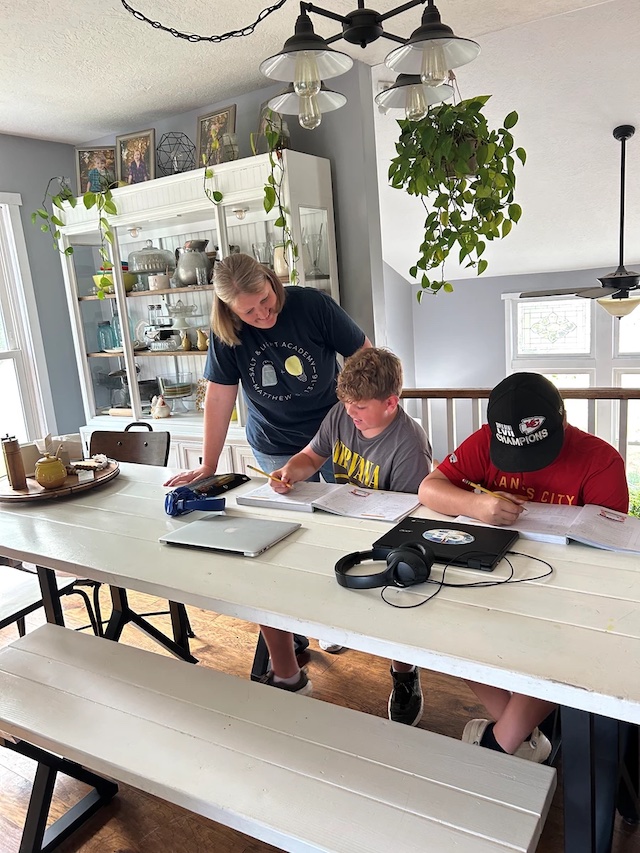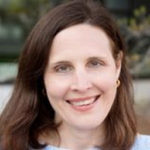Education entrepreneurs are finding joy in launching their own innovative learning programs and are spreading that joy to their learners.

Jennifer Hunt works with students at Salt + Light Academy in Kansas. Photo: Kerry McDonald
I spent much of last week in the greater Kansas City area visiting microschools and learning pods, and talking to founders, ahead of the Heartland Hybrid & Microschools Summit, hosted by Kansas Policy Institute.
All of the seven learning environments I visited in Kansas and Missouri were founded within the past three years and all of the founders are former public school teachers who quit and created these alternative programs. They all expressed greater levels of personal and professional fulfillment.
“I’m so much happier now,” said Jennifer Hunt, founder of Salt + Light Academy in Kansas. “I’m getting to teach how I always wanted to teach. It took the Covid shutdowns to realize my hands were tied in the public school classroom. That opened my eyes to seeing different models of education.”
At Salt + Light, children enjoy a highly-individualized curriculum tailored to their academic needs in community with adults and peers. Hunt taught in public schools for over a decade before quitting her job to create her microschool. It launched in 2021 with 10 kids and is now at capacity with nearly 30 mixed-age, mostly elementary-level students. Annual tuition is $7,500, with various tuition-reduction opportunities. Hunt is exploring the possibility of expanding to the middle school and high school levels in the coming months.
Hunt isn’t the only one who is happier. Her learners are too. She shared the story of one child with severe school-related anxiety who, after a short time attending Salt + Light, told his mother that he no longer had his Sunday night stomach aches that regularly plagued him before the start of each school week.
“This is a safe place,” said Hunt. “Everyone learns at a different level. They are so much more relaxed. Once they realize they can learn at their own pace and not be rushed, they’re settled and their hearts rest and they become curious again–just like they were as toddlers.”
About 10 miles away from Salt + Light, Tara Cassidy runs a similar microschool that also embraces individualized, learner-centered education. Cassidy was a public school teacher for 17 years, but grew increasingly frustrated with the institutional bureaucracy. “It wasn’t what I wanted to do anymore. It’s just paperwork and politics,” said Cassidy.
She was also not happy with her children’s experiences in the local public school system, and wanted to create something different. In August 2022, Cassidy launched Crossroad Trails Education Center with eight students in a commercial storefront location that previously housed a daycare center. By November, she had 20 students. To accommodate local demand for her program, Cassidy opened up walls and expanded into an adjacent space. She is now at capacity with 33 mixed-age learners in kindergarten through high school.
“I haven’t done any marketing,” said Cassidy, who has seen her program grow through word of mouth. Crossroad Trails is recognized as an unaccredited private school in Kansas with full- and part-time attendance options. Parents select the curriculum they want for their children that is aligned with their personal preferences and needs. This could range from virtual public school options to packaged homeschool curriculum and could be secular or faith-based. Cassidy offers the time and space for learners to work through their chosen curriculum, providing guidance, feedback and evaluation in collaboration with families.
Full-time annual tuition is $4,000, which is significantly lower than other local private education options but remains the main barrier to access. “Our families have the need but not the funding,” said Cassidy, who tries to find various ways to reduce tuition for families while supporting the expansion of education choice programs that enable funding to follow students.
Not far from Crossroad Trails is Rooted Life Academy, a home-based learning pod run by Becky McNichols who taught in public schools for 15 years, including most recently in a Title I public school that served predominantly low-income and migrant students. She gave so much of herself to her students and felt increasingly drained. “I felt like I was a pitcher pouring into a bucket full of holes,” said McNichols. “I felt I was empty by the end of the day and didn’t have enough for my own kids. Putting my family first was important.” It was her husband who suggested McNichols consider launching a learning pod in their home. “He was seeing that I wanted to give so much but couldn’t at the school,” said McNichols.
She resigned from her teaching job in the spring of 2022 and opened Rooted Life that fall with eight students ranging in age from kindergarteners to fourth graders. Today, her pod is at capacity with 12 students and a waiting list. Full-time annual tuition is $8,000. “When I decided to open Rooted Life, I felt so much peace,” said McNichols, whose two children also attend the program. “This has been a complete blessing.” She finds that the individualized approach to education nurtures a strong partnership with parents while enabling children to learn at their own pace and support each other in visible ways. “Public school was so competitive and this is so collaborative,” she said.
Education entrepreneurs in the Heartland and across the U.S. are finding joy in launching their own innovative learning programs and are spreading that joy to their learners.
Written by Kerry McDonald for the Foundation for Economic Education ~ October 20, 2023
~ The Author ~
 Kerry McDonald has a Master’s degree in education policy from Harvard University and a B.A. in Economics from Bowdoin College. She lives in Cambridge, Massachusetts with her husband and four never-been-schooled children. Kerry writes about education choice, parental empowerment, homeschooling, and natural learning on her blog, Whole Family Learning.
Kerry McDonald has a Master’s degree in education policy from Harvard University and a B.A. in Economics from Bowdoin College. She lives in Cambridge, Massachusetts with her husband and four never-been-schooled children. Kerry writes about education choice, parental empowerment, homeschooling, and natural learning on her blog, Whole Family Learning.
